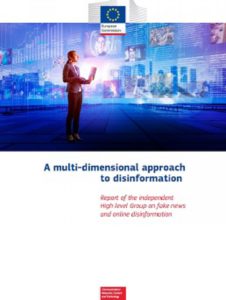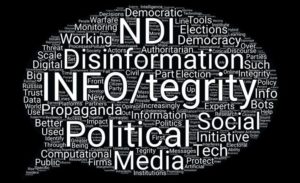 Today’s Russian disinformation campaigns, part of the Kremlin’s hybrid war against Western democracies, seem to have much in common with the infamous Zinoviev letter, says Shlomo Ben-Ami, a former Israeli foreign minister and Vice President of the Toledo International Center for Peace. But is their impact really comparable? Would Western democracies really look different today without Russian subterfuge? he asks on Project Syndicate:
Today’s Russian disinformation campaigns, part of the Kremlin’s hybrid war against Western democracies, seem to have much in common with the infamous Zinoviev letter, says Shlomo Ben-Ami, a former Israeli foreign minister and Vice President of the Toledo International Center for Peace. But is their impact really comparable? Would Western democracies really look different today without Russian subterfuge? he asks on Project Syndicate:
Russia does not pose an existential threat to Western democracy. The Soviet Union represented a far more formidable challenge, and it ended up collapsing under the weight of its own economic failure. Russia’s internal problems – not just economic stagnation, but also demographic decline – are of a similar scale. But this does not mean that Western democracy is safe.
 Putin has a goal: to make Europeans lose faith in their democratic institutions, according to investigative journalist Andrei Soldatov, who specializes in Russian security services and Kremlin-sponsored disinformation campaigns aimed at sowing discord in the West through bots, trolls and fake news.
Putin has a goal: to make Europeans lose faith in their democratic institutions, according to investigative journalist Andrei Soldatov, who specializes in Russian security services and Kremlin-sponsored disinformation campaigns aimed at sowing discord in the West through bots, trolls and fake news.
Soldatov, the co-founder and editor of the Russian media project Agentura, says that Putin first used disinformation campaign in Russia, and scored his first big international success during the annexation of Crimea in 2014. Since then, Moscow has been expanding its activities towards the West, he told El Pais.
“The goal of the campaign is not to convince you of anything,” said Soldatov. “Its real aim is to get everyone confused and make you distrust your democratic institutions. So they can disseminate all kinds of crazy stories, because the point is not to get people to believe them, but to get everyone confused.”
 The Cambridge Analytica case was not just a breach of private data, said Vera Jourova, the European Union commissioner for justice, consumers and gender equality. “This is much more serious, because here we witness the threat to democracy, to democratic plurality,” she told the New York Times:
The Cambridge Analytica case was not just a breach of private data, said Vera Jourova, the European Union commissioner for justice, consumers and gender equality. “This is much more serious, because here we witness the threat to democracy, to democratic plurality,” she told the New York Times:
Although many people had a general understanding that free online services used their personal details to customize the ads they saw, the latest controversy starkly exposed the machinery. Consumers’ seemingly benign activities — their likes — could be used to covertly categorize and influence their behavior. And not just by unknown third parties. Facebook itself has worked directly with presidential campaigns on ad targeting, describing its services in a company case study as “influencing voters.”

Sec Dev Foundation
“People are upset that their data may have been used to secretly influence 2016 voters,” said Alessandro Acquisti, a professor of information technology and public policy at Carnegie Mellon University. “If your personal information can help sway elections, which affects everyone’s life and societal well-being, maybe privacy does matter after all.”
Cambridge Analytica had multiple consultations with Lukoil and reportedly has done business in Russia. The firm’s key researcher worked simultaneously in St. Petersburg State University and received Russian grants, RFERL’s Polygraph reports.

Hewlett
Cambridge Analytica’s promise of elections driven by data ultimately implies a vision of government steered not by people but by algorithms, and by an expanding data-mining culture operating without restrictions, says Colin Koopman, an associate professor of philosophy and director of new media and culture at the University of Oregon.
That such threats to democracy are now possible is due in part to the fact that our society lacks an information ethics adequate to its deepening dependence on data. Where politics is driven by data, we need a set of ethics to guide that data. But in our rush to deliver on the promises of Big Data, we have not sought one, he writes for the New York Times:
What we need is for an ethics of data to be engineered right into the information skyscrapers being built today. We need data ethics by design. Any good building must comply with a complex array of codes, standards and detailed studies of patterns of use by its eventual inhabitants. But technical systems are today being built with a minimal concern for compliance and a total disregard for the downstream consequences of decades of identifiable data being collected on the babies being born into the most complicated information ecology that has ever existed.
 When the tech industry follows its natural impulses, it becomes even less transparent. That would hamper any long-term understanding of the relationship between social media and political views, an urgent question in Germany, Myanmar, Sri Lanka, the United States and many other places, the Times adds.
When the tech industry follows its natural impulses, it becomes even less transparent. That would hamper any long-term understanding of the relationship between social media and political views, an urgent question in Germany, Myanmar, Sri Lanka, the United States and many other places, the Times adds.
“To know the real interaction between populism and Facebook, you need to give much more access to researchers, not less,” said Paul-Jasper Dittrich, a German research fellow in digital economy at the Jacques Delors Institute.
There’s another reason Silicon Valley tends to be reluctant to share information about what it is doing. It believes so deeply in itself that it does not even think there is a need for discussion. The technology world’s remedy for any problem is always more technology.
“If Facebook and Google were merely interested in maximizing profits, we could regulate them,” said Maciej Ceglowski, who runs Tech Solidarity, a labor advocacy group. “But well-intentioned people can break things not easy to fix. It’s like a child running a bulldozer. They don’t have any sense of the damage they can do.”







